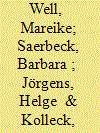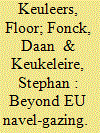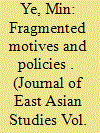|
|
|
Sort Order |
|
|
|
Items / Page
|
|
|
|
|
|
|
| Srl | Item |
| 1 |
ID:
171078


|
|
|
|
|
| Summary/Abstract |
International public administrations (IPA s) play a significant role for the success of multilateral negotiations. As the bureaucratic bodies of international organizations, they are deeply involved in international negotiations, but receive little credit for their outcomes. By studying the administrative styles of the Secretariat of the UN Framework Convention on Climate Change (UNFCCC), this article arrives at an understanding of how this IPA aims at contributing to the outcome of multilateral climate change negotiations. Administrative styles can be conceived of, ideal typically, as being entrepreneurial or servant-like. The article observes that, despite a prohibitively strict mandate as a technocratic facilitator, the UNFCCC Secretariat adopts an entrepreneurial style at the policy initiation stage and a cautiously entrepreneurial style during the policy formulation phase. It has acquired a distinctive actor quality in the climate regime, motivated by a strong commitment to furthering meaningful cooperation and driving the UNFCCC process toward ambitious climate policies.
|
|
|
|
|
|
|
|
|
|
|
|
|
|
|
|
| 2 |
ID:
147691


|
|
|
|
|
| Summary/Abstract |
Whilst concerns about the EU-centric character of EU foreign policy analysis have become more frequent in recent years, a systematic toolbox for diagnosing and remedying this problem is still lacking. This article’s contribution is twofold. First, it proposes a new typology of three approaches to foreign policy analysis, offering conceptual body and nuance to the debate on EU-centrism. The typology can be used for scrutinising existing analyses, as well as for shaping new research projects. Second, this typology is applied in a meta-analysis of post-Lisbon EU foreign policy scholarship: a built-for-purpose dataset of 451 articles was analysed, covering all work on EU foreign policy published in seven key journals for the period 2010–2014, was analysed. It was found that academic work on EU foreign policy wass indeed rife with EU-centric research questions, and, moreover, that this is the case irrespective of either the policy area under study or the focus of the journal.
|
|
|
|
|
|
|
|
|
|
|
|
|
|
|
|
| 3 |
ID:
181838


|
|
|
|
|
| Summary/Abstract |
Observers have portrayed the Belt and Road Initiative (BRI) variously, as China's great-power strategy, global infrastructure initiative, or commercial projects. Each characterization has had logical reasoning and evidence to support it. But how? How has one initiative been shown to have such varied motives? This article unpacks the Chinese state and establishes that a “tri-block” structure consisting of political leadership, bureaucracy, and economic arms has accounted for such varied motivations and actors in the BRI in China. In the BRI process, the leadership employed strategic rhetoric, and bureaucracies imposed policy ideas. Yet, more pervasively, the implementers have followed commercial motives in specific projects. BRI's strategic rhetoric and hazardous investment have generated external critiques and anti-China backlash, forcing Beijing to readjust the initiative. However, given the tri-block state structure, Beijing's policy adjustment will not be sufficient. Economic actors’ incentives need to be shifted too.
|
|
|
|
|
|
|
|
|
|
|
|
|
|
|
|
|
|
|
|
|